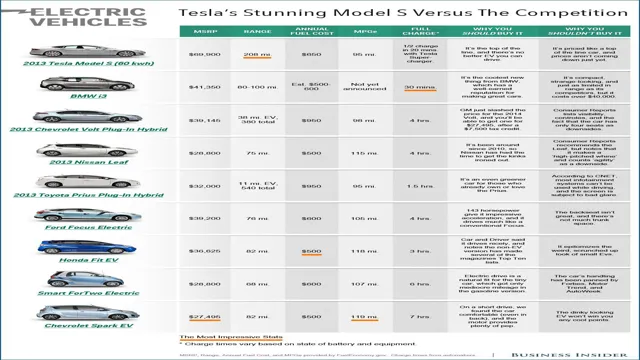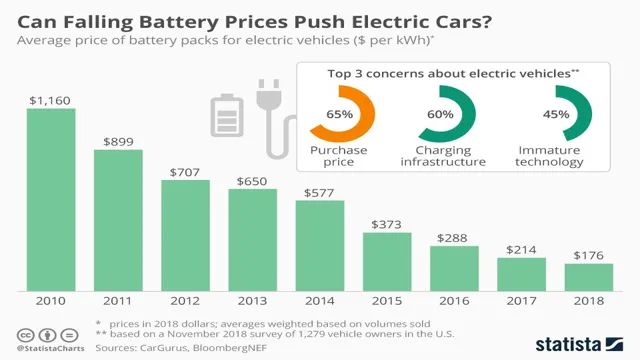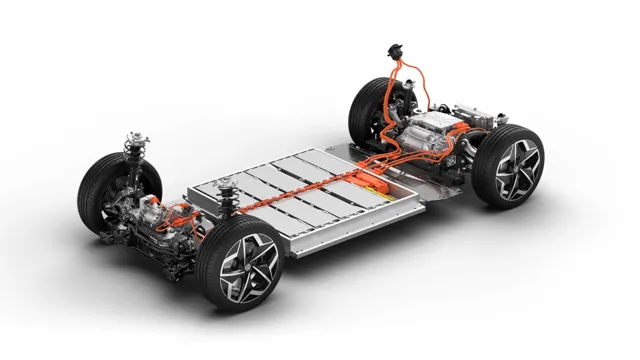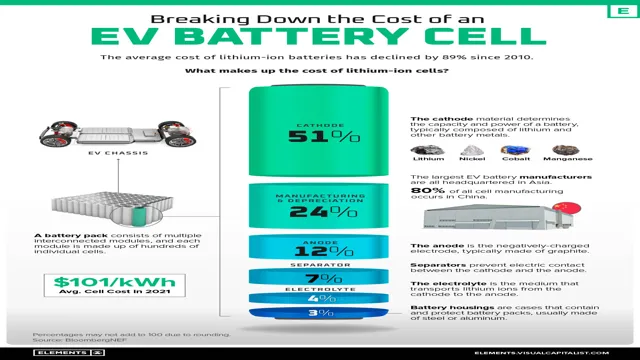Unveiling the Real Average Battery Size of Electric Cars: What You Need to Know
Electric cars have become increasingly popular in recent years, and many people are starting to see the benefits of owning one. One of the benefits of an electric car is that you don’t have to worry about filling up with gas regularly, as they are powered by rechargeable batteries. However, one question that often comes up for those considering buying an electric car is, “what is the average battery size of electric cars?” The answer to this question depends on the make and model of the electric car.
Different manufacturers use different battery sizes to power their vehicles. The average battery size largely depends on the range of the car. If the range is larger, the battery will typically be larger as well.
For example, a smaller electric car with a range of around 100 miles may have a smaller battery size of around 30 kWh, while a larger electric SUV with a range of 300 miles may have a larger battery size of around 100 kWh. Ultimately, the battery size of an electric car is important to consider when purchasing one. Larger battery sizes can provide more range, but they can also increase the cost of the vehicle.
There are also other factors to consider, such as charging time and the availability of charging stations. Despite these considerations, however, electric cars are becoming an increasingly attractive option for those looking for a more environmentally-friendly and cost-effective mode of transportation.
Introduction
When people consider purchasing an electric car, one of the most important factors they consider is the average battery size. Unlike traditional gas-powered vehicles, electric cars rely entirely on battery power, making the battery capacity a crucial aspect that determines the car’s performance. The average battery size of electric cars has been increasing in recent years as manufacturers seek to extend the range and improve the efficiency of their vehicles.
Currently, the average battery size of electric cars is around 60 kWh, which can provide a range of 200-300 miles. However, this is not a one-size-fits-all solution, as different electric vehicles have different battery capacities, and some cars can have smaller or larger battery sizes depending on their model and intended use. Therefore, when choosing an electric car, prospective buyers must consider how much driving they’ll be doing to determine the appropriate battery size for their commute.
Why Battery Size Matters
As technology evolves, smartphones and other electronic devices are becoming more integral to our daily lives. However, despite these advancements, battery life remains an issue for many users. This is why battery size matters.
A larger battery typically means longer battery life and less frequent charging, which is something most of us can appreciate. When choosing a device, it’s therefore important to consider battery size, as it can have a significant impact on the overall user experience. But it’s not just about the size of the battery.
Factors like usage patterns, display resolution, and processing power can all impact how long a battery lasts, which is why it’s crucial to understand these factors and make informed purchasing decisions. Ultimately, the question of whether a device’s battery size matters comes down to personal preference and usage habits.
Factors Affecting Battery Size
Determining the appropriate battery size for a device or application can be a challenging task, as it depends on several factors. Battery size plays a crucial role in determining the performance and lifespan of a device. The capacity and run time of a battery depend on its size and the amount of energy it can store.
Larger battery sizes are suitable for heavy-duty devices that require more power, while smaller battery sizes are suitable for smaller devices that draw less power. The power consumption of a device, its size, weight, and intended use also affects the battery size. Additionally, the type of battery chemistry used in the battery, such as lithum-ion or nickel-metal hydride, can also have an impact on battery size.
The key is to strike the right balance between battery size, weight, and performance to meet the requirements of the device and provide optimal long-term usability.
Current Average Battery Sizes
As electric cars continue to gain popularity, the average battery size is also increasing. Currently, the average battery size for an electric car is around 60 kWh (kilowatt hours), with some models offering up to 100 kWh. This is a significant increase from just a few years ago when the average battery size was closer to 30 kWh.
The larger battery size allows for longer driving ranges, with some electric cars now able to travel over 300 miles on a single charge. Additionally, larger battery sizes also mean faster charging times, with some models able to charge up to 80% in just 30 minutes. As technology continues to advance, we can expect to see even larger battery sizes and even longer driving ranges in the future, making the switch to electric cars even more appealing.
Comparison of Top Electric Cars’ Battery Sizes
Electric Vehicles’ Battery Sizes. As electric vehicles become more prevalent, it’s essential to compare their battery sizes. The current average battery size of electric cars is roughly 60 kWh, with most models ranging between 40 and 100 kWh.
The Tesla Model S’s battery is one of the highest, with a capacity of 100 kWh, giving it an unparalleled range of up to 402 miles. Other models like the Nissan Leaf and the Chevrolet Bolt come in at 40 kWh and 60 kWh, respectively, with estimated ranges of 150 miles and 259 miles. More extensive battery sizes increase the range of an electric car, and that’s ideal for long drives.
However, larger battery packs are also more expensive than their modest counterparts. Nonetheless, a battery size’s size isn’t all that matters. Battery chemistry, build quality, and thermal management are some other essential factors that affect the battery’s performance and overall life span.
With advances in technology, we can only expect battery capacity to increase and costs to come down, making electric vehicles accessible to even more people.
Trends in Battery Size Development
Battery Size Development As electric vehicles become increasingly popular and more manufacturers shift towards producing greener cars, the development and improvement of battery technology and therefore battery size is crucial. The current average battery size in most electric cars on the market is around 60 kWh. However, this number is expected to increase in the coming years as manufacturers seek to improve the driving range of their cars.
It’s important to note that electric vehicle batteries vary widely in size, with some small EV models having batteries as small as 15 kWh and larger SUVs having batteries up to 100 kWh. The size of the battery depends on the car model and its intended use. For example, a city car may have a smaller battery than an SUV designed for long road trips.
Battery development is an ever-evolving technology, and as EV adoption rates continue to grow, further advancements in battery size and capacity are expected.
Future Predictions for Battery Sizes
Battery sizes have come a long way, from the bulky and heavy batteries of the past to the slim and sleek ones of today. As of 2021, most smartphones have an average battery size of around 4,000mAh, with some models boasting even bigger capacities of up to 5,000mAh. However, experts predict that battery sizes will continue to grow in the coming years, driven by the increasing demand for more power-hungry devices.
Some experts even predict that battery sizes of up to 10,000mAh may become the norm, especially for high-end smartphones and other gadgets. This holds a lot of promise for consumers, who will be able to use their devices longer without having to worry about charging them constantly. As technology advances, we can expect that battery sizes will continue to improve, paving the way for more innovative and exciting devices with long-lasting power capabilities.
How Battery Size Affects Range and Performance
When it comes to electric cars, the average battery size greatly affects both the range and performance of the vehicle. Simply put, the bigger the battery, the further the car can go on a single charge. This is because larger batteries store more energy, which can be used to power the car’s electric motor.
However, a bigger battery also means more weight, which can negatively impact the car’s performance. For example, a heavier car may not be as quick to accelerate or as nimble on the road. Additionally, larger batteries can be more expensive to manufacture, which can increase the cost of the electric vehicle.
Thus, when deciding on an electric car, it’s important to consider the average battery size and how it affects both range and performance, in addition to other factors such as cost and charging infrastructure.
Range vs. Battery Size Graphs and Analysis
When it comes to electric vehicles, one of the most important factors to consider is battery size and how it affects range and performance. Generally, the larger the battery size, the longer distance the car can travel on a single charge. However, it’s important to note that there are other factors that can also affect range, such as weather conditions, driving habits, and terrain.
That’s why it’s important to compare range vs. battery size graphs to get a more accurate understanding of how far an EV can travel on a single charge. It’s also worth noting that larger battery sizes often come with an increase in weight, which can impact factors like acceleration and handling.
Ultimately, it’s important to find the right balance between battery size and overall performance, so that you can enjoy all the benefits of driving an EV without sacrificing range or speed.
Impact of Battery Size on Acceleration and Speed
When it comes to electric vehicles, the size of the battery can have a significant impact on both range and performance. A larger battery typically means longer range before needing to recharge, but it also means the car can accelerate more quickly and reach higher speeds. This is because a larger battery can provide more power to the electric motor, allowing it to produce more torque and ultimately move the vehicle faster.
However, there are diminishing returns as the battery size increases, as the added weight can negatively impact the car’s handling and overall efficiency. Ultimately, finding the right balance between battery size and performance is key to achieving optimal results. So, if you’re in the market for an electric vehicle, be sure to consider the size of the battery and how it will impact your driving experience.
Conclusion
After delving into the inner workings of electric cars and their power sources, it’s clear that when it comes to the average battery size, bigger is definitely better. While manufacturers continue to push the boundaries of battery technology, the importance of range and reliability make it crucial to have a sizable energy source under the hood. So, while you may be tempted to settle for a smaller battery, the smart move is to think big and drive long!”
FAQs
What is the average battery size of an electric car?
The average battery size of an electric car is around 60 kWh. However, it varies depending on the car model and brand.
How far can an electric car go with a fully charged battery?
The distance an electric car can go with a fully charged battery depends on various factors such as the car model, battery size, driving conditions, etc. On average, most electric cars can travel between 100-300 miles on a single charge.
Can you upgrade the battery size of an electric car?
Battery size upgrades may be available for some electric cars, but it depends on the manufacturer and the car model. You should check with your local dealer or the car manufacturer to see if an upgrade is available for your electric car.
Are larger battery sizes more expensive for electric cars?
Yes, larger battery sizes are typically more expensive for electric cars. However, it may be worth investing in a larger battery size if you frequently drive long distances or if you live in an area with limited charging stations.




